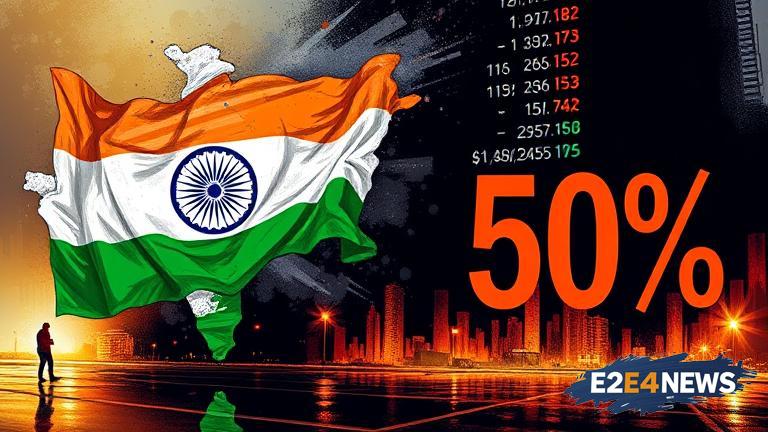The United States has imposed a 50% tariff on India, citing the country’s continued purchases of Russian oil despite international sanctions. This move is expected to have significant economic implications for India, which is already struggling with a weakening rupee and rising inflation. The rupee has hit a record low against the US dollar, trading at over 83 per dollar. The Indian stock market has also taken a hit, with the Sensex and Nifty indices tumbling by over 2%. The US has been critical of India’s decision to continue buying Russian oil, despite the international community’s efforts to isolate Russia economically. India has been one of the largest buyers of Russian oil, and the US has accused the country of undermining the effectiveness of sanctions. The Indian government has defended its decision, citing the need to ensure energy security and stabilize prices. However, the US has made it clear that it will not tolerate any country that continues to do business with Russia. The tariff imposed by the US is expected to affect a wide range of Indian exports, including textiles, pharmaceuticals, and steel. Indian exporters are likely to face significant challenges in the coming months, as they struggle to compete with other countries that are not subject to the same tariffs. The Indian government has announced that it will take all necessary steps to protect the interests of its exporters and mitigate the impact of the tariffs. However, the opposition has criticized the government for its handling of the situation, accusing it of failing to anticipate the consequences of its actions. The economic implications of the tariff are likely to be far-reaching, with the potential to affect not just Indian exporters but also the broader economy. The weakening rupee and rising inflation are already causing concerns, and the tariff is likely to exacerbate these problems. The Indian central bank has announced that it will take steps to stabilize the currency and control inflation, but the task is likely to be challenging. The US has made it clear that it will continue to monitor India’s actions and take further steps if necessary. The international community is also watching the situation closely, with many countries expressing concerns about the impact of the tariff on global trade. The European Union has announced that it will review its trade relations with India, citing concerns about the country’s compliance with international sanctions. The situation is likely to remain volatile in the coming months, with significant implications for the global economy. The Indian government will need to navigate the situation carefully, balancing its need to protect its exporters with its commitment to upholding international sanctions. The opposition has called for a comprehensive review of the country’s foreign policy, citing the need for a more nuanced approach to international relations. The economic implications of the tariff are likely to be felt for some time, with the potential to affect not just India but also other countries that trade with it. The situation is a reminder of the complex and interconnected nature of global trade, and the need for countries to work together to address common challenges.
